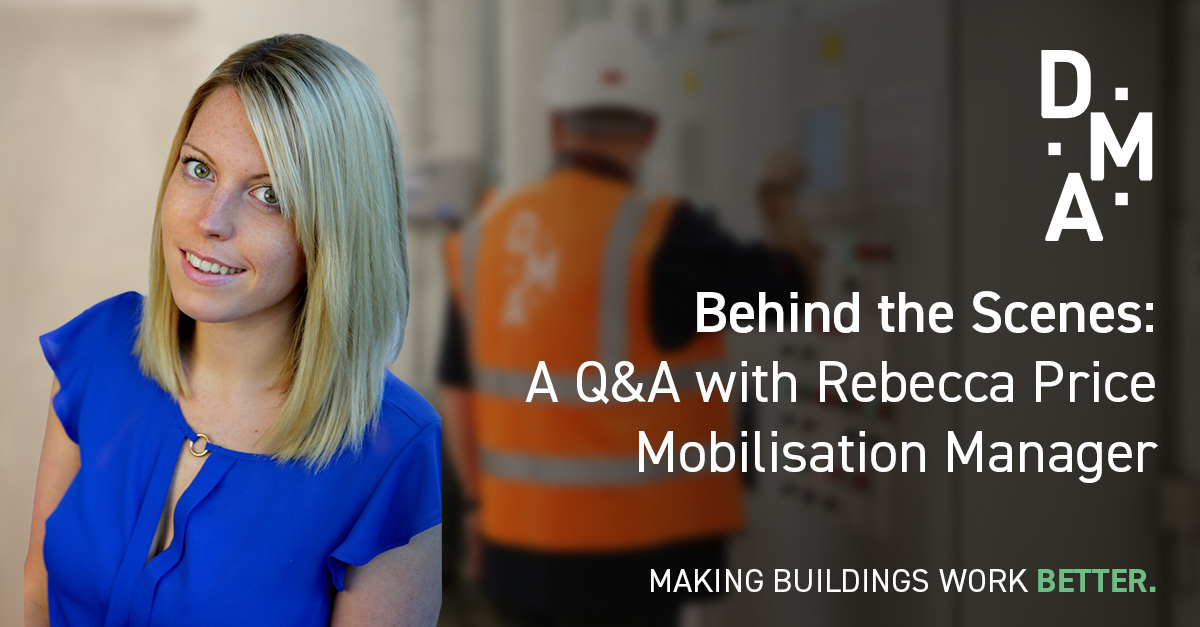
Mobilisation Behind the Scenes: A Q&A with Rebecca Price, Mobilisation Manager at DMA Group
When a new facilities management or building maintenance contract begins, the real work doesn’t start on day one of service delivery. It begins much earlier, with mobilisation. This is the period between contract award and full-service launch. It’s a critical phase that can make or break the long-term success of the contract.
We sat down with Rebecca Price, our Mobilisation Manager at DMA Group, to talk about what makes mobilisation successful, why it’s so important, and some of the common pitfalls to avoid.
What exactly is mobilisation in facilities management?
Rebecca:
Mobilisation is everything that happens between winning a contract and delivering the service operationally. It starts when we receive the asset data from the customer, and it includes understanding the building, setting up our internal systems, scheduling works, planning resource allocation, and making sure our engineers can get on site without delay. It also involves having conversations with the customer to understand their daily routines; things like access requirements, key contacts, even door codes. We need to make sure nothing gets missed so operations can run smoothly from day one
Why is this phase so important?
Rebecca:
If mobilisation isn’t handled properly, it can cause real problems down the line. Asset verification, in particular, is key. If the data we receive from the customer is inaccurate or incomplete, and we don’t verify it properly, then operations suffer later on. We’ve learned the hard way that skipping steps here has consequences. It’s also during mobilisation that relationships are built. Open communication from day one can lead to successful long-term partnerships.
What are the biggest challenges you’ve encountered?
Rebecca:
There are a few recurring ones. Asset verification is a big one. If we can’t get access to all areas or the data is poor, we can’t accurately plan our services. This leads to cost variations and compliance risks later.
Job grouping is also incredibly important. We need to make sure work is logically grouped for engineers. For example, something listed as electrical might actually need a plumber. Missteps here affect efficiency and cause frustration on site.
Lastly, consumables, particularly with boiler servicing. If we don’t have the right service kits because data was missing, engineers can’t complete their work. That’s frustrating for everyone.
These are avoidable, but only if we get the right information and maintain close communication with both customers and our operational teams.
Can you share a successful mobilisation story?
Rebecca:
One that stands out is a contract we re-secured after having previously lost it five years prior. The customer came back to us, and we were awarded six buildings—three familiar and three completely new. We carried out asset verification even on the familiar ones and discovered some compliance assets had been missed in the original data. That led to difficult budget conversations, but we worked collaboratively with the customer to reallocate some tasks to their in-house team and ensure compliance without blowing the budget.
Thanks to how well the mobilisation went, and the smooth first year, they’ve since given us four more buildings. We’re now managing ten in total. That’s a great example of how good mobilisation builds trust and leads to long-term partnerships
What’s the key to getting mobilisation right?
Rebecca:
Communication, 100%. We’ve had to have some difficult conversations, especially when cost variations arise. But if you’ve built a relationship based on honesty and openness, those conversations become easier. You can’t deliver good service without trust, and that starts during mobilisation. Pick up the phone. Be transparent. That’s how you build partnerships that last beyond year one
Final thoughts?
Rebecca:
Mobilisation is the hidden engine room of contract delivery. If we’ve done our job well, no one notices. Everything just works. But getting to that point takes planning, detail, and above all, teamwork. We’re not just starting a contract, we’re setting it up for success.
Summary
Mobilisation is more than an administrative task—it’s a strategic phase that defines the success of facilities management contracts. From asset verification to team coordination and relationship-building, it’s a discipline in its own right. Thanks to experienced professionals like Rebecca Price, DMA Group ensures every mobilisation is handled with care, precision, and a human touch.
If you’re considering switching providers or launching a new facilities management contract, talk to us about how we can make the mobilisation process seamless.

Rebecca Price is the Mobilisation Manager at DMA Group, bringing over 11 years of experience across various departments within the company. Starting her journey as an admin assistant, Rebecca went on to manage fleet operations, lead the customer care team, and support the sales and marketing function. After returning from maternity leave, she stepped into the mobilisation role, where she has spent the past five years ensuring the seamless transition of contracts from tender to live operations.
Rebecca leads a team responsible for every aspect of mobilisation—from reviewing asset data at tender stage and setting up internal systems to liaising with clients about site access, compliance, and day-to-day logistics. Her meticulous attention to detail and strong cross-functional collaboration ensures that each contract is handed over to the operations team in a way that sets it up for long-term success.




